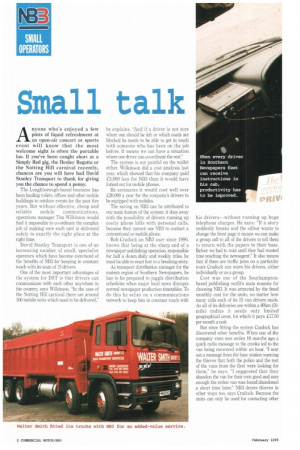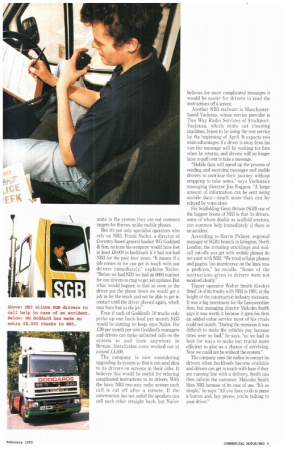Small talk
Page 104

Page 105

If you've noticed an error in this article please click here to report it so we can fix it.
Anyone who's enjoyed a few pints of liquid refreshment at an open-air concert or sports event will know that the most welcome sight is often the portable loo. If you've been caught short at a Simply Red gig, the Henley Regatta or the Notting Hill carnival recently, chances are you will have had David Stanley Transport to thank for giving you the chance to spend a penny.
The Loughborough-based business has been hauling toilets, offices and other mobile buildings to outdoor events for the past five years. But without effective, cheap and reliable mobile communications, operations manager Tim Wilkinson would find it impossible to co-ordinate the complex job of making sure each unit is delivered safely to exactly the right place at the right time.
David Stanley Transport is one of an increasing number of small, specialist operators which have become convinced of the benefits of NB3 for keeping in constant touch with its team of 15 drivers.
One of the most important advantages of the system for DST is that drivers can communicate with each other anywhere in the country, says Wilkinson, "In the case of the Notting Hill carnival there are around 100 mobile units which need to be delivered," he explains. "And if a driver is not sure where one should be left or which roads are blocked he needs to be able to get in touch with someone who has been on the job before. It means we can have a situation where one driver can co-ordinate the rest."
The system is not painful on the wallet either. Wilkinson did a cost analysis last year, which showed that his company paid £5,000 less for N133 than it would have forked out for mobile phones.
He estimates it would cost well over 120,000 a year for the company's drivers to be equipped with mobiles.
The saving on NB3 can be attributed to one main feature of the system: it does away with the possibility of drivers running up costly phone bills with personal calls, because they cannot use NB3 to contact a conventional or mobile phone.
Bob Cradock an NB3 user since 1990, knows that being at the sharp end of a newspaper publishing operation, responsible for half a dozen daily and weekly titles, he must be able to react fast to a breaking story.
As transport distribution manager for the eastern region of Southern Newspapers, he has to be prepared to juggle distribution schedules when major local news disrupts normal newspaper production timetables. To do this he relies on a communications network to keep him in constant touch with his drivers—without running up huge telephone charges. He says: "If a story suddenly breaks and the editor wants to change the front page it means we can make a group call to all of the drivers to tell them to return with the papers to their base. Before we had to wait until they had wasted time reaching the newsagent." It also means that if there are traffic jams on a particular route Cradock can warn his drivers, either individually or as a group.
Cost was one of the Southamptonbased publishing outfit's main reasons for choosing NB3. It was attracted by the fixed monthly cost for the units, no matter how many calls each of its 15 van drivers made. As all of its deliveries are within a 80km (50mile) radius it needs only limited geographical cover, for which it pays £17.50 per month a unit.
But since fitting the system Cradock has discovered other benefits. When one of the company vans was stolen 18 months ago a quick radio message to the crooks led to the van being recovered within an hour. "I sent out a message from the base station warning the thieves that both the police and the rest of the vans from the fleet were looking for them," he says. "I suggested that they abandon the van for their own good and sure enough the stolen van was found abandoned a short time later." NB3 deters thieves in other ways too, says Cradock. Because the units can only be used for contacting other units in the system they are not common targets for thieves, unlike mobile phones.
But it's not only specialist operators who rely on NB3. Frank Nailor, a director of Coventry-based general haulier WG Goddard & Son, reckons his company would have lost at least £8,000 in backloads if it had not had NB3 for the past four years. "It means if a jab comes in we can get in touch with our drivers immediately," explains Nailor, "Before we had NB3 we had an 0800 number for our drivers to ring to get job updates. But what would happen is that as soon as the driver put the phone down we would get a job in for the truck and not be able to get in contact until the driver phoned again, which may have lost us the job."
Even if each of GoddarcIs 10 trucks only picks up one back-load per month NB3 would be earning its keep, says Nailor. For 139 per month per unit Goddard's managers and drivers can make unlimited calls on the system to and from anywhere in Britain. Installation costs worked out at around 14,500.
The company is now considering upgrading its system so that it can send data to its drivers on screens in their cabs. It believes this would be useful for relaying complicated instructions to its drivers. With the basic NB3 two-way radio system each call is cut off after a minute. If the conversation has not ended the speakers can call each other straight back, but Nailor believes for more complicated messages it would be easier for drivers to read the instructions off a screen.
Another NB3 stalwart is Manchesterbased Vaclensa, whose service provider is Two Way Radio Services of Stockport. Vaclensa, which rents out cleaning machines, hopes to be using the text service by the beginning of April. It expects two main advantages: if a driver is away from his van the message will be waiting for him when he returns, and drivers will no longer have to pull over to take a message.
"Mobile data will speed up the process of sending and receiving messages and enable drivers to continue their journey without stopping to take notes," says Vaclensa's managing director Jim Foggon. "A large amount of information can be sent using mobile data—much more than can by relayed by voice alone For Scaffolding Great Britain (SGB) one of the biggest boons of N113 is that its drivers, some of whom double as scaffold erectors, can summon help immediately if there is an accident.
According to Barrie Palmer, regional manager of SGB's branch in Islington, North London, the irritating cracklings and midcall cut-offs you get with mobile phones do not exist with NB3. "We tried cellular phones and pagers, but interference on the lines was a problem," he recalls. "Some of the instructions given to drivers were not received clearly."
Tipper operator Walter Smith (Groby) fitted 14 of its trucks with NB3 in 1991, at the height of the construction industry recession. It was a big investment for the Leicestershire firm, but managing director Malcolm Smith says it was worth it because it gave his firm an added-value service most of his rivals could not match. "During the recession it was difficult to make the vehicles pay because rates were so bad," he says, "so we had to look for ways to make our trucks more efficient to give us a chance of surviving. Now we could not be without the system."
The company uses the radios to contact its drivers when backloads become available and drivers can get in touch with base if they are running late with a delivery. Smith can then inform the customer. Malcolm Smith likes NB3 because of its ease of use. "It's so simple," he says. "All you have to do is press a button and, hey presto, you're talking to your driver."














































































































